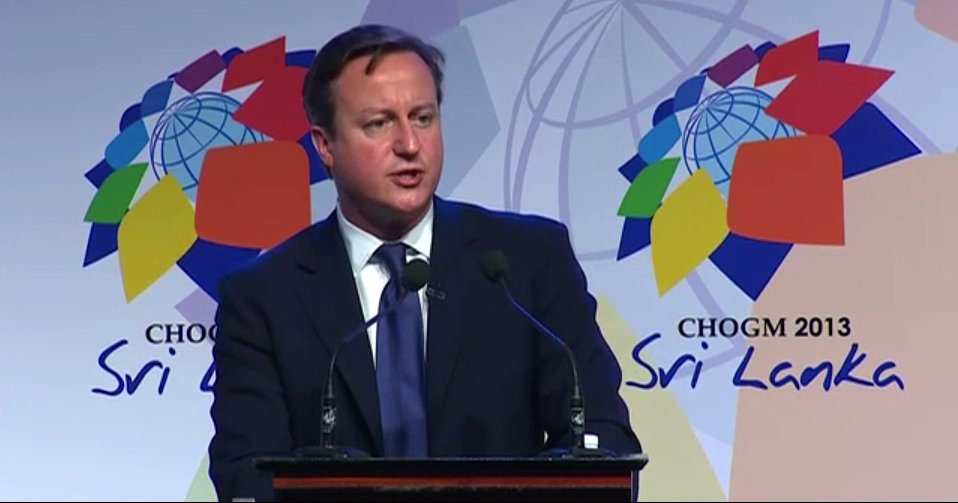 |
British Prime Minister David Cameron put Sri Lanka on notice Saturday to conduct an "credible, transparent and independent" investigations into allegations of war crimes by March or else he would lead a push for action at the United Nations.
But Sri Lanka remained defiant, with government ministers dismissing Mr. Cameron’s warning as “nothing new” and accusing him of interfering with Sri Lanka’s sovereignty.
See reports by AFP, AP and Sky News.
Speaking in Colombo at the controversial Commonwealth leaders’ summit (see video here), Mr. Cameron said:
"Let me be very clear, if an investigation is not completed by March, then I will use our position on the UN Human Rights Council to work with the UN Human Rights Commission and call for a full, credible and independent international inquiry."
"The Sri Lankan government needs to go further and faster on human rights and reconciliation."
"I accept it takes time but I think the important thing is to get on the right track.
"I sense that they do want to make progress on these issues and it will help having international pressure to help make that matter."
"This issue [war crimes] is not going to go away, it's an issue of international concern."
However, Sri Lanka reacted defiantly to Mr. Cameron's comments.
Economic development minister Basil Rajapaksa, who is also the President Mahinda Rajapaksa's brother, said: "Why should we have an internal inquiry?"
"We will object to it ... Definitely we are not going to allow it," he said.
Nimal Siripala de Silva, a senior government minister, said: “We will resist an international inquiry. That is the policy of the government.”
He dismissed the threat of UN pressure as “nothing new,” after several years of outcry from international human rights groups, the UN and Western governments, including the United States.
“Britain cannot do this alone. We are confident that we go before the UNHCR and make our case that it has done enough,” he said.
Mr. Cameron also spoke of how he had "frank" exchanges Friday with Sri Lankan President Mahinda Rajapaksa after he returned from a historic visit to the war-torn Jaffna region.
Asked by reporters about the 45-minute meeting, Cameron said "very strong views were expressed on both sides", adding "Of course not everything I said was accepted."
Britain’s Channel 4 News said it learnt that the encounter was “pretty lively” and, referring to the 45 seconds worth of television footage released to media, Foreign Affairs Correspondent Jonathan Miller said “there is a strong sense from the pictures of the meeting having been brusque, curt and frosty.”
A source who was present at the bilateral told Channel 4 the British prime minister had “repeatedly and robustly” raised war crimes allegations, human rights and freedom of the press.
According to a statement from Rajapaksa's office, the president asked Cameron to give Sri Lanka "more time to overcome all major challenges", AFP said.
On Friday, Mr. Cameron upstaged the first day of the three-day CHOGM summit by travelling to the Jaffna, soon after the conference opened.
The first foreign leader to visit Jaffna since 1948, Mr. Cameron received an emotional reception from people who were desperate to tell him of their plight during the war and in its aftermath. See our post on his visit here.
According to AFP, while Sri Lanka had hoped the summit of the 53 member state-bloc would showcase its revival since the mainly Sinhalese army crushed the Tamil Tigers in 2009, Mr. Cameron's visit and boycotts by the leaders of Canada, India and Mauritius have torpedoed Colombo’s strategy.
